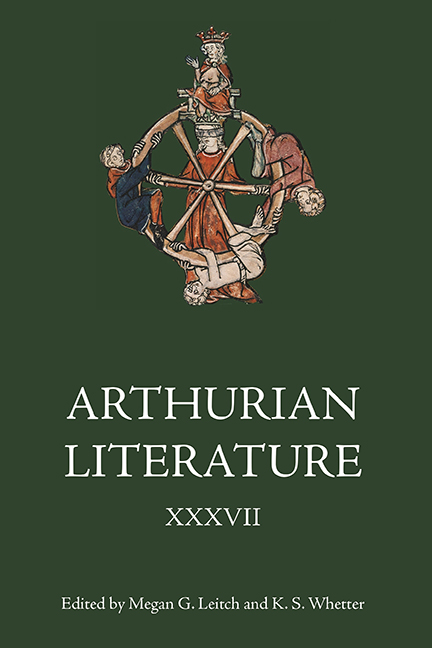Book contents
- Frontmatter
- Contents
- List of Charts and Tables
- Professor Fiona Tolhurst (1968–2021)
- General Editors’ Preface
- List of Contributors
- List of Abbreviations
- Introduction: The Tournament at Mapplemalleoré: Malory at 550
- 1 Malory and the Stock Phrase
- 2 The Artistry of Malory’s Mercantile Metaphors: Goods, Generosity, and the Source of ‘The Tale of Sir Gareth’
- 3 ‘A grete bourder and a passynge good knyght’: Sir Dinadan: ‘Gareth with a Twist’
- 4 Moonlight in the Nocturnal Typology of Malory’s Morte Darthur
- 5 ‘That shall nat ye know for me as at thys tyme’: Cognitive Narratology and Filling Malory’s Gaps
- 6 ‘On a tyme’: Action and Temporality in Malory’s ‘Sankgreal’
- 7 Hospitality in Malory
- 8 The Haunting of the Orkneys and Malory’s Arthurian Project
- 9 ‘I love nat to be constreyned to love’: Launcelot and Coerced Sex
- 10 Eradicating Victorian Backreading: Re-reading Malory’s Gwenyvere through Gaynour and Isode
- contents of previous volumes
9 - ‘I love nat to be constreyned to love’: Launcelot and Coerced Sex
Published online by Cambridge University Press: 15 September 2022
- Frontmatter
- Contents
- List of Charts and Tables
- Professor Fiona Tolhurst (1968–2021)
- General Editors’ Preface
- List of Contributors
- List of Abbreviations
- Introduction: The Tournament at Mapplemalleoré: Malory at 550
- 1 Malory and the Stock Phrase
- 2 The Artistry of Malory’s Mercantile Metaphors: Goods, Generosity, and the Source of ‘The Tale of Sir Gareth’
- 3 ‘A grete bourder and a passynge good knyght’: Sir Dinadan: ‘Gareth with a Twist’
- 4 Moonlight in the Nocturnal Typology of Malory’s Morte Darthur
- 5 ‘That shall nat ye know for me as at thys tyme’: Cognitive Narratology and Filling Malory’s Gaps
- 6 ‘On a tyme’: Action and Temporality in Malory’s ‘Sankgreal’
- 7 Hospitality in Malory
- 8 The Haunting of the Orkneys and Malory’s Arthurian Project
- 9 ‘I love nat to be constreyned to love’: Launcelot and Coerced Sex
- 10 Eradicating Victorian Backreading: Re-reading Malory’s Gwenyvere through Gaynour and Isode
- contents of previous volumes
Summary
Much has been written about Malorian women's agency, or lack thereof, when it comes to sexual encounters. However, I think our readings of male sexuality could be more nuanced. From this perspective, I would like to suggest different readings of men, particularly Launcelot, as victims of attempted or successful coercion. Sexual agency in Sir Thomas Malory's Le Morte Darthur is – as always – more complex than it first appears, and the text does, in fact, contain numerous male characters who suffer attempts to coerce them into sex. This is a genuine threat to those knights: to their salvation, to their fidelity to their ladies, and sometimes to their physical health and even lives. The knights respond with fear, revulsion, and anger.
In Malory's text, we find several cases of sexual violence perpetrated against knights in general and against Launcelot specifically, yet the sexual coercion of men is not always recognised as such, and there is a certain reluctance to use the term ‘rape’ even in what appear to be obvious cases. Launcelot is the most common target of this kind of violence, which is often triggered by his prowess and his widely known love for Guinevere. I will focus here mainly on his interaction with Elaine of Corbyn and Elaine of Ascolat, as cases of rape and sexual coercion. Furthermore, those cases of sexual violence cause Launcelot deep distress and loss of identity.
As concerns terminology, I will be using both the term ‘rape’ and ‘sexual coercion’ here: not to differentiate between the gravity of the situations, but because ‘sexual coercion’ covers both successful and unsuccessful attempts, without my having to distinguish those using the unwieldy ‘attempted rape’. ‘Sexual coercion’ is generally applied to sexual assault that does not rely on physical force, but I am not primarily concerned with this legal usage. Nevertheless, the women of Malory's text do not generally use physical force. Exceptions do exist, but to achieve the sexual contact they desire, women in Malory generally rely on other means than violence: magic, threats, drugs, and deception. Yet, if we term Uther's deception of Igraine rape (3.32–4.4), as Corinne J. Saunders does, surely so are these cases.
- Type
- Chapter
- Information
- Arthurian Literature XXXVIIMalory at 550: Old and New, pp. 175 - 192Publisher: Boydell & BrewerPrint publication year: 2022



